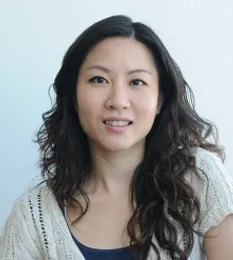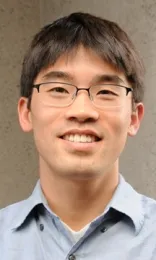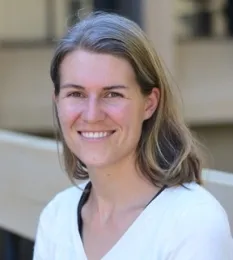Two UC Davis Department of Entomology and Nematology faculty members are now full professors, and a third faculty member has achieved tenure as associate professor.
Molecular geneticist and physiologist Joanna Chiu, vice chair of the department, and community ecologist Louie Yang were promoted from associate professors to professors, effective July 1. Community ecologist Rachel Vannette was promoted from assistant professor to associate professor.

Chiu Lab
Professor Chiu joined the Department of Entomology and Nematology in 2010 as an assistant professor and advanced to associate professor and vice chair in 2016. She received her bachelor's degree in biology and music from Mount Holyoke College, Mass., and her doctorate in molecular genetics in 2004 from New York University, New York. She served as a postdoctoral fellow from 2004 to 2010 in chronobiology (biological rhythms and internal clocks)--molecular genetics and biochemistry--at the Center for Advanced Biotechnology and Medicine, at Rutgers, the State University of New Jersey.
Chiu's research expertise includes molecular genetics of biological timing and posttranslational regulation of proteins. She uses animal models including Drosophila melanogaster and mice to study the mechanisms that regulate circadian and seasonal physiology and behavior. Major grants from the National Institutes of Health and the National Science Foundation fund her biological rhythms research. In addition to her research in biological rhythms, Chiu also aims to leverage her expertise in genomics to address key issues in global food security.
In 2019, she was named one of 10 UC Davis Chancellor's Fellows, an honor awarded to associate professors who excel in research and teaching.
Chiu and Yang co-founded and co-direct (with Professor Jay Rosenheim) the campuswide Research Scholars Program in Insect Biology, launched in 2011 to provide undergraduates with a closely mentored research experience in biology. The program crosses numerous biological fields, including population biology; behavior and ecology; biodiversity and evolutionary ecology; agroecology; genetics and molecular biology; biochemistry and physiology; entomology; and cell biology. The goal is to provide academically strong and highly motivated undergraduates with a multi-year research experience that cultivates skills that will prepare them for a career in biological research.

Yang Lab
Professor Yang, who holds a bachelor's degree (ecology and evolution) from Cornell University, 1999, received his doctorate from UC Davis in 2006, and joined the UC Davis faculty in 2009. In 2013, he received a prestigious National Science Foundation Faculty Early Career Development Award of $600,000. He was named a UC Davis Hellman Fellow in 2012; the Hellman Family Foundation contributes funds to support and encourage the research of promising assistant professors who exhibit potential for great distinction in their research. He was promoted to associate professor in 2015.
Yang won the 2018 Outstanding Faculty Academic Advising Award from NACADA, also known as the Global Community for Academic Advising; and the 2017 Faculty Advisor Award of Excellence in NACADA's Pacific Region 9, comprised of California, Nevada and Hawaii.
Yang says of the research underway in his lab: “We study how species interactions change over time. We apply a diversity of approaches and perspectives to a diversity of systems and questions. We do experimental community ecology. We also use observational methods, meta-analysis, conceptual synthesis, ecosystem perspectives, and theoretical models. We like data, and we like learning new things.”

Vannette Lab
Associate Professor Vannette joined the UC Davis Department of Entomology and Nematology in 2015 after serving as a postdoctoral fellow at Stanford University's biology department, where she was a Gordon and Betty Moore Foundation Postdoctoral Fellow from 2011 to 2015 and examined the role of nectar chemistry in community assembly of yeasts and plant-pollinator interactions.
Vannette received her bachelor of science degree, summa cum laude, in 2006 from Calvin College, Grand Rapids,Mich., and her doctorate from the University of Michigan's Department of Ecology and Evolutionary Biology, Ann Arbor, in 2011. She received a Hellman Fellowship grant in 2018 and a National Science Foundation Faculty Early Career Development Award in 2019 to study microbial communities in flowers and a National Science Foundation grant to support work on solitary bee microbiomes.
Of her research, Vannette says: “ All plants are colonized by microorganisms that influence plant traits and interactions with other species, including insects that consume or pollinate plants. I am interested in the basic and applied aspects of microbial contributions to the interaction between plants and insects. I also use these systems to answer basic ecological questions, such as what mechanisms influence plant biodiversity and trait evolution.”
“The Vannette lab is a team of entomologists, microbiologists, chemical ecologists, and community ecologists trying to understand how microbial communities affect plants and insects (sometimes other organisms, too),” she says. “We often study microbial communities in flowers, on insects or in soil. We rely on natural history observations, and use techniques from chemical ecology, microbial ecology and community ecology. In some cases, we study applied problems with an immediate application including pathogen control or how to support pollinators. Other questions may not have an immediate application but are nonetheless grounded in theory and will contribute to basic knowledge and conservation (e.g. how can dispersal differences among organisms affect patterns of abundance or biodiversity?)”

